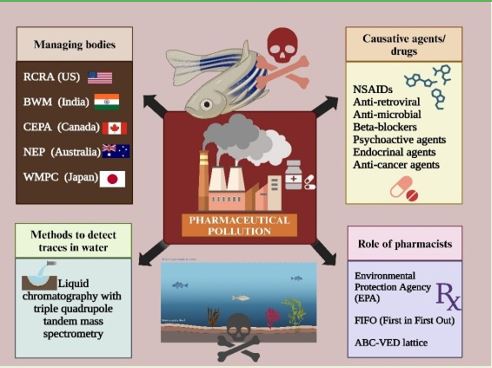Volume 10, Issue 1 (March 2025)
J Environ Health Sustain Dev 2025, 10(1): 2499-2520 |
Back to browse issues page
Ethics code: NA
Download citation:
BibTeX | RIS | EndNote | Medlars | ProCite | Reference Manager | RefWorks
Send citation to:



BibTeX | RIS | EndNote | Medlars | ProCite | Reference Manager | RefWorks
Send citation to:
Tushir R, Das S, Chauhan A, Gurjar S, Bhanwala L, Patnaik S et al . Exponential Global Health Hazards of Pharmaceutical Pollution and Its Preventive Measures: A Comprehensive Review. J Environ Health Sustain Dev 2025; 10 (1) :2499-2520
URL: http://jehsd.ssu.ac.ir/article-1-843-en.html
URL: http://jehsd.ssu.ac.ir/article-1-843-en.html
Renu Tushir 
 , Sanjita Das *
, Sanjita Das * 

 , Ajesh Chauhan
, Ajesh Chauhan 
 , Saurav Gurjar
, Saurav Gurjar 
 , Lakshay Bhanwala
, Lakshay Bhanwala 
 , Sneha Patnaik
, Sneha Patnaik 

 , Anushka Jain
, Anushka Jain 



 , Sanjita Das *
, Sanjita Das * 

 , Ajesh Chauhan
, Ajesh Chauhan 
 , Saurav Gurjar
, Saurav Gurjar 
 , Lakshay Bhanwala
, Lakshay Bhanwala 
 , Sneha Patnaik
, Sneha Patnaik 

 , Anushka Jain
, Anushka Jain 


Department of Pharmacy, SMAS, Galgotias University, Plot No. 2, Sector 17-A, Yamuna Expressway, Greater Noida-201310, Uttar Pradesh, India
Abstract: (1066 Views)
Introduction: Antimicrobial agents from different categories like antibiotics, anti-parasitic agents, and other agents such as Xeno (estrogens) can exert some intimidating effects on the environment that can be ecotoxicological as well. Disposal of chemicals in the form of drugs in various water bodies such as lakes, ponds, rivers, and commonly used drinking water might cause potential health damage to human, animal, and aquatic life via environmental pollution. Thus, production of such waste requires proper disposal and supervision, which might be a hurdle for the medical personnel, city administrators, workers working in the industry involved in recycling, and planners of policies.
Materials and Methods: The review is taken the help of resources for getting appropriate information are PubMed, Google Scholar, Scopus, Web of Science very carefully. The period of time for article search in databases varied from 2001-2023. The articles between this time range were included.
Results: In the present study, an effort was made to pinnacle sources, categories, and information regarding various drugs and regulatory bodies across the globe to control these functions. To overcome the pharmaceutical pollution issues, functions, categories of wastes, and strategies to resolve were elaborated.
Conclusion: The study highlighted the crucial function of pharmacists in reducing pharmaceutical waste and evaluated current water management policies, emphasizing the necessity for cohesive efforts to diminish pollution. Moreover, an examination of existing regulatory frameworks revealed inadequacies and provided suggestions for improved monitoring and enforcement. This comprehensive report aimed to offer practical recommendations for the advancement of sustainable pharmaceutical waste management techniques, aiding in the protection of world health and the environment.
Highlights:
Materials and Methods: The review is taken the help of resources for getting appropriate information are PubMed, Google Scholar, Scopus, Web of Science very carefully. The period of time for article search in databases varied from 2001-2023. The articles between this time range were included.
Results: In the present study, an effort was made to pinnacle sources, categories, and information regarding various drugs and regulatory bodies across the globe to control these functions. To overcome the pharmaceutical pollution issues, functions, categories of wastes, and strategies to resolve were elaborated.
Conclusion: The study highlighted the crucial function of pharmacists in reducing pharmaceutical waste and evaluated current water management policies, emphasizing the necessity for cohesive efforts to diminish pollution. Moreover, an examination of existing regulatory frameworks revealed inadequacies and provided suggestions for improved monitoring and enforcement. This comprehensive report aimed to offer practical recommendations for the advancement of sustainable pharmaceutical waste management techniques, aiding in the protection of world health and the environment.
Highlights:
- Pharmacists make an important contribution to controlling and managing pharmaceutical waste.
- P, U, D drugs classification describes names of harmful drugs.
- Each country has its regulatory bodies to control pharma pollution.
- Each country formulates guidelines and practices for controlling pharmaceutical pollution to regulate waste management.
- Proper plans and policies should be followed on time to overcome pharmaceutical pollution.

Keywords: Waste Management, Environment, Biological Products, Environmental Pollution, Antibiotics, Government Agencies.
Type of Study: Systematic Review |
Subject:
Environmental pollution
Received: 2024/11/16 | Accepted: 2025/01/20 | Published: 2025/03/10
Received: 2024/11/16 | Accepted: 2025/01/20 | Published: 2025/03/10
Send email to the article author
| Rights and permissions | |
 |
This work is licensed under a Creative Commons Attribution-NonCommercial 4.0 International License. |




